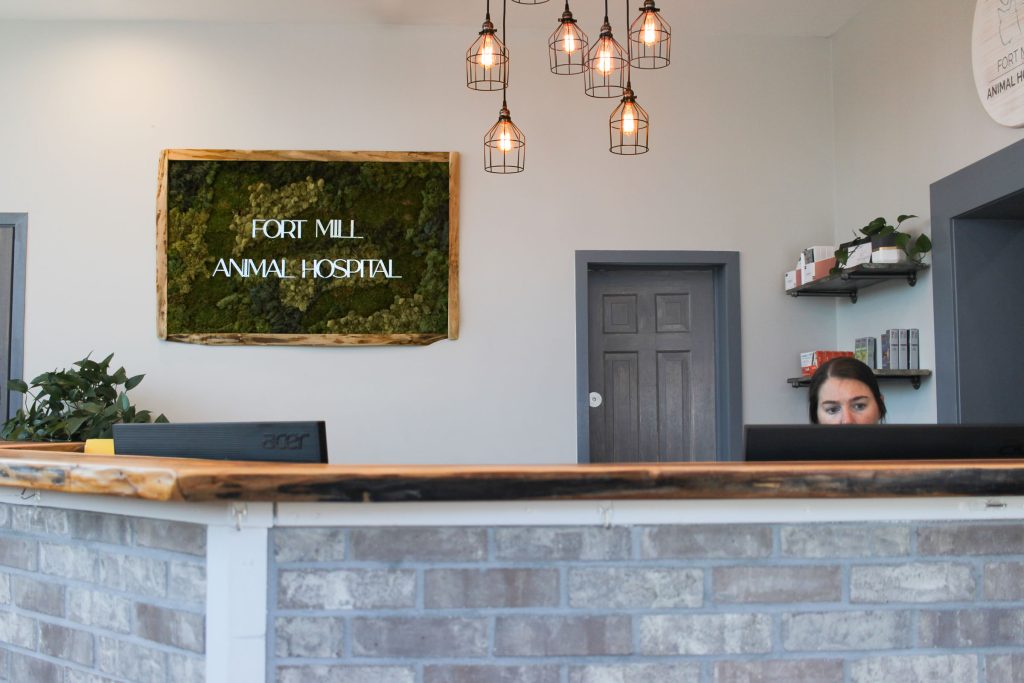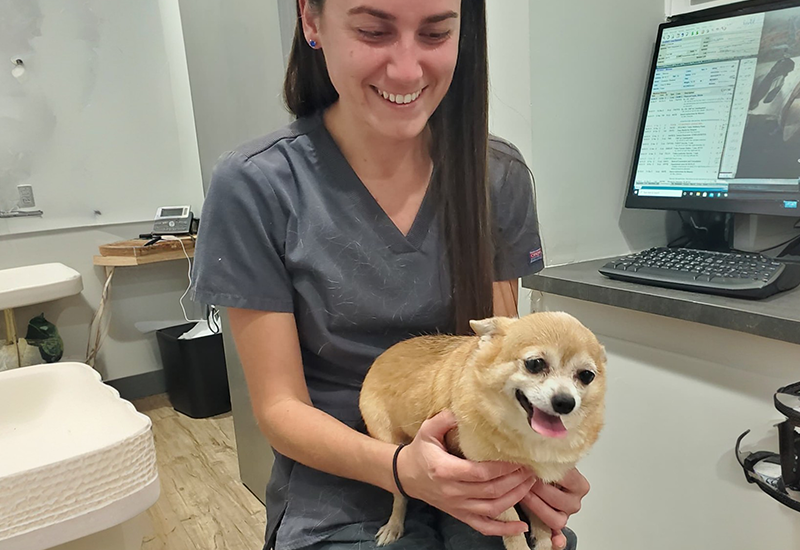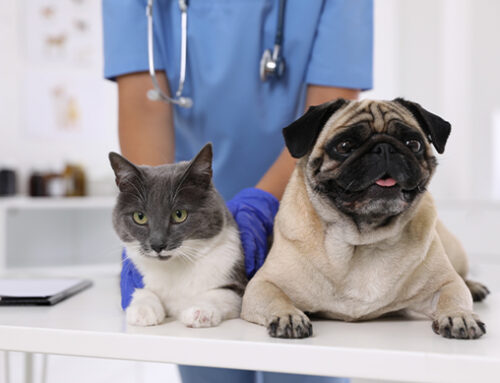Your pet’s wellness exam is more than a routine visit, it’s the most important appointment of the year. Wellness exams help catch potential problems before they become significant. They give your veterinarian a chance to check your pet’s weight, teeth, heart, joints, and more – all in one visit. Even if your dog or cat seems perfectly fine, these checkups often reveal early signs of issues that aren’t obvious at home.
At Fort Mill Animal Hospital, we believe preventive care is the key to a longer, healthier life. Whether you’ve got a playful puppy, a mellow senior cat, or a pet at an age and stage in between, annual exams help keep your pet feeling their best.
What Is a Pet Wellness Exam?
An annual pet check is a full-body assessment – nose to tail. It allows us to catch changes early, update preventive care, and give you a chance to talk through any concerns with us. A pet wellness exam typically includes a physical exam, weight and temperature check, oral health exam, recommended vaccinations, parasite prevention, lab work, and a discussion about lifestyle and behavior.
Routine wellness checks are for dogs and cats that are presumed healthy. If your pet is showing signs of illness or injury, a separate visit may be needed for diagnostics or treatment.
Pet Wellness Exams: How Often, What to Expect, and What They Cost
Regularly scheduled wellness exams not only help your pet stay healthy, but they also give you peace of mind that you’re giving your dog or cat the best care as they grow and mature. By understanding what they need and when, you can tailor your care to their lifestyle and keep up with age-appropriate screenings.
How often should a dog or cat go to the vet?
We’ll cover some breed specific considerations in the next section, but as a general rule:
- Puppies and kittens need to visit every few weeks for vaccines and early development checks.
- Adult dogs and cats (ages 1–7) should come in at least once a year for a full wellness check, even if they appear healthy.
- Senior dogs and cats (ages 7+) benefit from exams every six months, as health issues become more common with age.
Note, cats are notorious for hiding pain and illness. It’s especially important for senior cats, who are most prone to kidney disease, hyperthyroidism, and arthritis, to see their vet as recommended.
What’s included in a pet wellness exam?
Pet wellness exams include a full physical checkup and a conversation about their overall health, behavior, and lifestyle. While the core components are similar for dogs and cats, we tailor each exam based on species, age, and individual needs – every animal is different, and every pet check is customized with that in mind.

Here’s what you can expect:
- Full physical exam – We check eyes, ears, teeth, heart, lungs, abdomen, joints, skin, etc.
- Weight and body condition scoring – Tracking trends over time helps us catch early signs of illness or discomfort.
- Oral health screening – Dental disease is common in both dogs and cats; especially in small dog breeds and senior cats.
- Vaccine review – Based on age, lifestyle, travel habits, and risk of exposure.
- Parasite prevention – Dogs are typically tested for heartworms and reviewed for flea/tick prevention; even indoor cats can be at risk for fleas or intestinal parasites.
- Lab work – We may recommend annual blood tests, intestinal parasite screening, or urinalysis, especially for senior pets or those with chronic conditions.
- Behavior and appetite check-in – Subtle changes in mood, energy, or eating habits can be early warning signs, especially in cats.
How much does a cat or dog wellness exam cost?
Wellness exam costs for pets vary depending on their age, size, and specific health needs. Exams for healthy adults are usually straightforward and affordable. Senior pets may require additional lab work to monitor for early signs of age-related conditions.
At Fort Mill Animal Hospital, we’ll always walk you through any recommended services and provide an estimate before moving forward. Preventive care is one of the best ways to avoid more serious – and more expensive – health problems down the road.
Dog & Cat Breeds With Special Consideration
Breed plays a big role in how often a pet should see their vet and what kind of care they may need. While the general guideline is annual wellness exams for healthy adult pets, some breeds benefit from more frequent visits or specialized monitoring, especially as they age.
Caring for Different Dog Breeds
-
Large and giant breeds
Such as Great Danes, Mastiffs, and Bernese Mountain Dogs
Often age faster and may need senior-style monitoring earlier, around age 5-6
Prone to joint issues like hip/elbow dysplasia and arthritis -
Brachycephalic breeds
Such as Bulldogs, Pugs, and Frenchies
May require more frequent check-ins for respiratory issues, skin folds, and eye care
Heat sensitivity and exercise intolerance should also be monitored -
Toy breeds
Such as Chihuahuas and Yorkies
More prone to dental disease, which can progress quickly without regular vet care
Some have tracheal collapse risks requiring early detection -
Working/herding breeds
Such as Border Collies, Australian Shepherds, and Labs
Often active and athletic; need mobility and weight monitoring to avoid orthopedic issues
Prone to genetic conditions like epilepsy or heart disease in some lines
Caring for Different Cat Breeds
-
Brachycephalic breeds
Such as Persians, Himalayans, and other flat-faced cats
May need more frequent monitoring for eye drainage, breathing, and dental issues -
Maine Coons
Prone to hypertrophic cardiomyopathy (HCM), a common heart disease that may require early screening
-
Oriental breeds
Such as Siamese, Balinese and Tonkinese
Some are more prone to GI sensitivity, asthma, or behavioral quirks, early discussions with a vet are helpful
How Pet Wellness Exams Help Catch Problems Early
Pets are experts at hiding discomfort. By the time you notice something’s wrong, a condition may already be advanced.

During pet checks, we look for subtle shifts in weight, dental health, mobility, or behavior that might point to something underlying. We may also recommend lab work to check organ function, detect infections, or monitor for age-related conditions. Here are just a few examples of what we often find during a routine visit:
- Dental disease – Often missed at home, especially in small dogs and senior cats
- Arthritis – Periodic stiffness or reluctance to jump may be signs of joint pain
- Weight gain or loss – May signal thyroid issues, diabetes, or other internal problems
- Skin growths – Lumps and bumps are common and worth checking early
- Heart murmurs – May be a sign of heart disease that needs monitoring or treatment
Catching these issues early gives you and your pet more options. It can also make treatment easier, less expensive, and more effective in the long run.
5 Tips To Prepare for a Wellness Exam
A little preparation can help you get the most out of your pet’s visit, and make the experience smoother for everyone involved. Here are a few simple steps you can take before your appointment:
-
Bring a Fresh Stool Sample
This helps us check for intestinal parasites. Aim for a sample collected within 24 hours and kept cool (don’t freeze it). A zip top bag labeled with your pet’s name and the date of collection is typically fine, or you can stop by the clinic ahead of your appointment for a stool sample collection container if you’d prefer. If a more specialized test is needed (e.g., for Giardia or parasites that degrade quickly), we may request a sample in a specific solution or container.
-
Make a List of Questions or Concerns
Have you noticed any changes in appetite, behavior, energy, weight, or bathroom habits? Write them down so you don’t forget during the visit.
-
Bring Your Pet’s Records
If you’re new to Fort Mill Animal Hospital, bring any vaccine history, test results, or prior medical records if you have them. We’re happy to initiate a records transfer from your previous practice ahead of time, too. Note that your pet will receive care even without prior records.
-
Transport Your Pet Safely
Use a secure crate for cats and small dogs. Leash larger dogs. A familiar blanket or towel can help ease anxiety, especially when misted with a pheromone spray (such as Feliway for cats or Adaptil for dogs). Keep in mind, some pets may be more manageable for you and the care team with the aid of mild sedation. If you feel this may be beneficial for your pet, be sure to ask ahead of time.
-
Try to Stay Calm
Pets often pick up on your energy. Speaking in a calm, positive voice can help your pet feel more at ease.
Our team is here to make your pet’s wellness visit as comfortable and stress-free as possible. If you have any questions before your appointment, please connect with us.
Your Partner in Preventive Care: Fort Mill Animal Hospital

At Fort Mill Animal Hospital, we believe that wellness exams are at the foundation of your four-legged friend’s health, wellness, happiness, and quality of life. We take time to understand every pet’s needs – from curious kittens to senior dogs, and those managing health conditions along the way. Every exam includes thoughtful, personalized care and a chance to ask questions about nutrition, behavior, lifestyle, and more.
Whether it’s time to get back on track or you’re simply planning ahead, book online or call the clinic to schedule a routine wellness check for your dog or cat – we can’t wait to care for your pet!







Leave A Comment